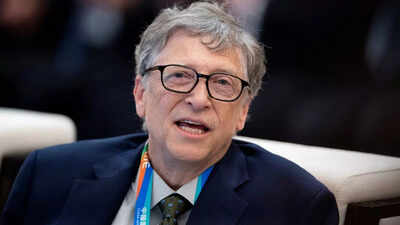ARTICLE AD BOX

Microsoft
co-founder Bill Gates has claimed that while artificial intelligence (AI) can currently replace humans in simpler tasks, but it is not capable enough to handle the most complex coding tasks yet. The tech billionaire shared his insights on the rapid progression of
AI
in an interview with CNN’s Fareed Zakaria. Gates noted that experts in the field disagree on whether AI will achieve this capability within the next one to two years or if it is still a decade away. However, he highlighted that AI is "improving at a rate that surprises" him. Gates said this while differentiating between basic AI and
Artificial General Intelligence
(AGI), which has now become a common topic of discussion.
What Bill Gates said about AI’s progression
In the interview, which is available on YouTube, Gates said: “People talk about writing code. Simple coding tasks, AI today can replace human work. The most complex coding tasks, it's not able to do it yet. And people in the field disagree if that is (happening) in the next year or two, or is it more like ten years away? But AI is improving at a rate that surprises me.cThings like this deep research capability. Few times a day I take some complex question and just for fun, I see that AI does an awfully good job, gathering all the materials and bringing it and summarising what I need to know.”
Bill Gates on AI’s impact on different types of jobs
Explaining how AI’s ability to substitute labour or human creativity, Gates added: “People use very different definitions. You can say when is AI is so good that something like a telesales job or a telesupport job, just having the AI do that work, that it's way cheaper and more accurate than humans are. So that's really looking at the labour substitution piece. Or you can look at the most creative things that humans do, like come up with a new drug that helps with tuberculosis. So, is AI just helping humans get this done, or is it eventually replacing humans?”The interviewer also asked Gates about how AI can impact roles involving pattern recognition, like paralegals or entry-level accountants, and how it may make it harder for college-educated graduates to find jobs in such fields.Replying to this, Gates said: “When you improve productivity, you can make more. If you get less productive, that's bad, and if you get more productive, that's good. It means you can free up these people to have smaller class sizes, have longer vacations, or to help do more. So it's not a bad thing. The question is, does it come so fast that you don't have time to adjust to it?In parallel, the blue-collar work, when the robotic arms start to be decent, which they're not today. That starts to affect even larger classes of labour. So this is a profound set of changes. I'm working with Microsoft and OpenAI on these things. My lens is to let's make sure it gets out in low-income countries to help with their health, education and agriculture.”



.png)
.png)
.png)
















 2 hours ago
6
2 hours ago
6









 English (US) ·
English (US) ·